专业英语作业生态学
生态学专业英语词汇
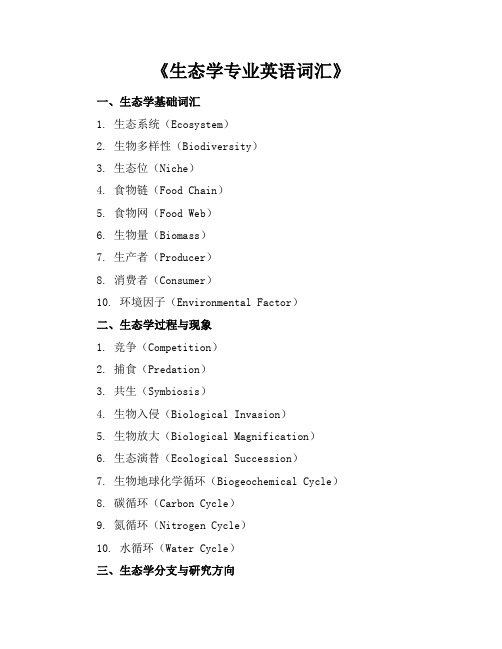
《生态学专业英语词汇》一、生态学基础词汇1. 生态系统(Ecosystem)2. 生物多样性(Biodiversity)3. 生态位(Niche)4. 食物链(Food Chain)5. 食物网(Food Web)6. 生物量(Biomass)7. 生产者(Producer)8. 消费者(Consumer)10. 环境因子(Environmental Factor)二、生态学过程与现象1. 竞争(Competition)2. 捕食(Predation)3. 共生(Symbiosis)4. 生物入侵(Biological Invasion)5. 生物放大(Biological Magnification)6. 生态演替(Ecological Succession)7. 生物地球化学循环(Biogeochemical Cycle)8. 碳循环(Carbon Cycle)9. 氮循环(Nitrogen Cycle)10. 水循环(Water Cycle)三、生态学分支与研究方向1. 景观生态学(Landscape Ecology)2. 生态系统生态学(Ecosystem Ecology)3. 行为生态学(Behavioral Ecology)4. 进化生态学(Evolutionary Ecology)5. 环境生态学(Environmental Ecology)6. 应用生态学(Applied Ecology)7. 恢复生态学(Restoration Ecology)8. 城市生态学(Urban Ecology)9. 乡村生态学(Rural Ecology)10. 海洋生态学(Marine Ecology)四、生态学实验与技术研究1. 生态调查(Ecological Survey)2. 样方调查(Quadrat Sampling)3. 实验设计(Experimental Design)4. 遥感技术(Remote Sensing)5. 地理信息系统(GIS)6. 生态模型(Ecological Model)7. 生态模拟(Ecological Simulation)8. 环境监测(Environmental Monitoring)9. 生态修复(Ecological Restoration)10. 生物指示物(Bioindicator)五、生态学政策与管理1. 生态保护(Ecological Conservation)2. 生态红线(Ecological Red Line)3. 生态补偿(Ecological Compensation)4. 生态规划(Ecological Planning)5. 生态风险评估(Ecological Risk Assessment)6. 可持续发展(Sustainable Development)7. 生态文明建设(Ecological Civilization Construction)8. 环境影响评价(Environmental Impact Assessment)9. 生态系统服务(Ecosystem Services)10. 自然保护区(Nature Reserve)六、生态学理论与概念深化1. 生态效率(Ecological Efficiency)描述能量或物质在生态系统中从一个营养级传递到下一个营养级的效率。
专业英语口语的课堂生态学研究

( 广州工商职 业技术学院 Байду номын сангаас 广东广州 505) 1 80
【 要】为了提 高高职 高专院校专业英语 口语教 学质量 , 摘 笔者运用课 堂生态学审视 了其课 堂现 象。笔者发现 高职高专专业英语 口语课 堂生态环境存在花盘效应、 超耐度、 生环境破 坏等等 问题。 共 笔者分析 问题在 于生态住 重 叠严重。为了解 决上述弊端解 决的 方法有课 堂形式从封 闭走 向开放和 变限制 因子为非 限制 因子。 【 关键词J课 堂生态学 ; 高职 高专 ; 专业 英语 口语 【 中图分类号】G6 2 2 【 4 . 1 文献标识码J 4 A 【 文章编号】17 -9 82 1) 1 190 6 15 1(0 00 - 0 ・2 0 d i1.9 9 .s . 7 .9 82 1.1 5 o:0 6 /i n1 15 1. 00 . 4 3 js 6 0 0 【 刊 网址 lh p / wwh x . t 本 t :w .b bn t / e 教育生态学是- f新兴的交叉学科 , -- j 采取从生态学的视角 来分析教育 问题和现象 的研究方法 , 成为我们理解和解决教育 问题 的重要工具。外语教育 生态系统是整个教育系统的子系 统, 专业英语 口语课堂生态又是外语教育生态的子系统 。 课堂 生态环境是否健康, 直接影 响着我 国高校尤其是高职高专 的专 业英语 口语教学的质量 。
、
一
育实现 了大众化与多样化 , 高等职业教育作为高等教育三大层 次之一得到了国家政策的大力支持, 招生规模不断扩大 , 社会 价值 日益凸显。但是, 高等职业教育 尚处于初步发展阶段, 教 育教学尚未成熟, 有必要采取课堂生态学对其进行 审视 。 实用外语教育在高等职业教育 中一直得到重视 , 但是一直 以来如何有效提高其教学质量是一个头疼的问题, 尤其是专业 英语 口语。 专业英语 口语 一般 开设在 大学教育的中期, 是纯语 言与纯专业交叉的一门实践性很强的课程 , 往往能够激发学生 的兴趣, 但是客观存在 的课堂 问题又令学生焦虑, 学生处境进 退维谷。专业英语 口语课堂生态环境是否健康关系到高职高 专能否培养 出合 格的涉外复合型技能人 才。 二、 专业英语 口语课 堂生态环境现状
生态学专业英语教程
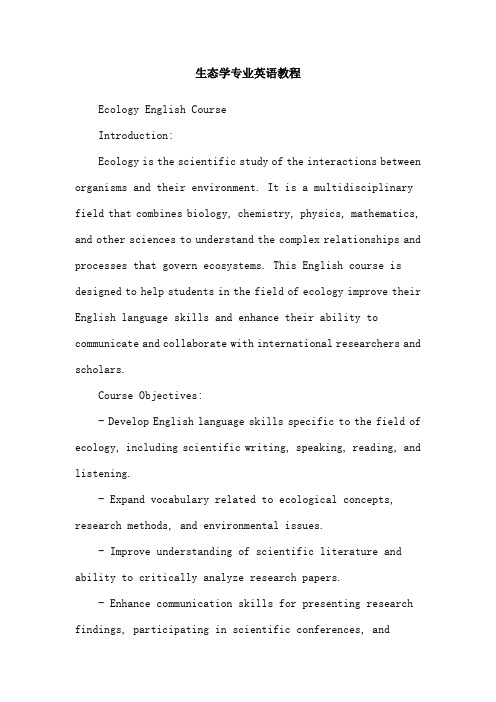
生态学专业英语教程Ecology English CourseIntroduction:Ecology is the scientific study of the interactions between organisms and their environment. It is a multidisciplinary field that combines biology, chemistry, physics, mathematics, and other sciences to understand the complex relationships and processes that govern ecosystems. This English course is designed to help students in the field of ecology improve their English language skills and enhance their ability to communicate and collaborate with international researchers and scholars.Course Objectives:- Develop English language skills specific to the field of ecology, including scientific writing, speaking, reading, and listening.- Expand vocabulary related to ecological concepts, research methods, and environmental issues.- Improve understanding of scientific literature and ability to critically analyze research papers.- Enhance communication skills for presenting research findings, participating in scientific conferences, andcollaborating with international colleagues.- Foster cross-cultural communication and understanding in the context of ecological research.Course Content:1. Introduction to Ecology: This module provides an overview of the principles and concepts of ecology, including the levels of organization, energy flow, and nutrient cycling in ecosystems.2. Ecological Research Methods: This module focuses on the various methods used in ecological research, including field studies, laboratory experiments, and modeling techniques.3. Biodiversity and Conservation: This module explores the importance of biodiversity, the threats to biodiversity, and the strategies for conservation and restoration.4. Climate Change and Ecology: This module examines the impacts of climate change on ecosystems and the role of ecology in mitigating and adapting to these changes.5. Ecological Interactions: This module explores the interactions between organisms, including predation, competition, mutualism, and parasitism.6. Ecological Modeling: This module introduces the use of mathematical and computer models in ecological research andtheir applications in predicting ecosystem dynamics.7. Ecotoxicology: This module focuses on the study of the effects of pollutants on organisms and ecosystems and the strategies for pollution prevention and remediation.8. Human Ecology: This module examines the interactions between humans and the environment, including the impacts of human activities on ecosystems and the development of sustainable practices.Assessment:- Regular quizzes and assignments to test understanding of course materials.- Research paper writing and presentation to demonstrate scientific writing and communication skills.- Participation in group discussions and debates to promote critical thinking and collaboration.This ecological English course aims to provide students with the necessary language skills and knowledge to excel in their academic and professional endeavors in the field of ecology. By the end of the course, students will be equipped with the tools to effectively communicate scientific ideas, engage in interdisciplinary research, and contribute to the global effort of understanding and protecting our environment.。
生态学的基本内容英文版
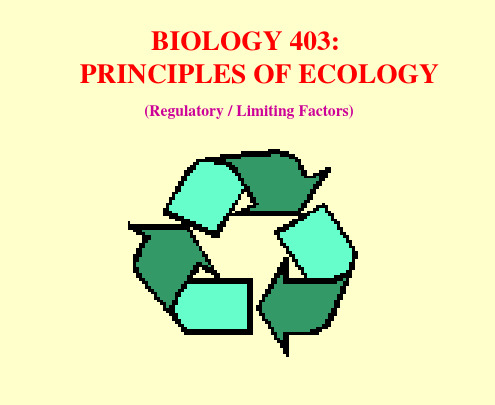
• Sp. B does well in ‘normal’ soils that have been autoclaved
• bacterial toxins from bacteria that live only in the ‘normal’ soils inhibit Sp. B
• PARAPHRASED: the weakest link determines the strength of the chain
WEAKNESSES IN LIEBIG’S LAW
• he was only interested in nutrients
• interested only in the effects from nutrient deficiency
LIEBIG’S LAW OF THE MINIMUM
• Justus Liebig (1830’s-1840’s, agronomist)
• From his work we get what some call Liebig’s Law of the Minimum
• The size of a crop is determined by the essential nutrient that is present in minimal amount.
• a particular organism may have narrow ranges of tolerance for some factors, medium for others and wide for yet others
生态学专业英语

生态学专业英语Ecology is the scientific study of the relationships between living organisms and their environment. It is a multidisciplinary field that encompasses biology, chemistry, geology, and physics. Ecologists study the interactions between organisms and their environment, including how organisms adapt to their environment and how they affectthe environment. The goal of ecology is to understand the principles that govern the distribution and abundance of organisms.Ecologists use a variety of methods to study ecosystems, including field observations, laboratory experiments, and mathematical modeling. They may study a wide range of organisms, from microorganisms to plants and animals, and their interactions with each other and their environment.One important concept in ecology is the idea of the ecosystem, which is a community of organisms and thephysical environment with which they interact. Ecosystems can be as small as a pond or as large as a forest, and they can include both living and nonliving components.Ecologists study how energy and nutrients flow throughecosystems and how these flows influence the distribution and abundance of organisms.Another important concept in ecology is the idea of sustainability, which is the ability of an ecosystem to maintain its balance over time. Ecologists study how human activities, such as agriculture, urbanization, and pollution, affect the sustainability of ecosystems and how we can manage ecosystems to promote sustainability.In conclusion, ecology is a fascinating and important field that helps us understand the natural world and how we can live in harmony with it. By studying the interactions between organisms and their environment, ecologists can help us make informed decisions about how to manage our natural resources and protect the environment for future generations.生态学是一门研究生物与环境之间关系的科学。
各专业英语专业名词
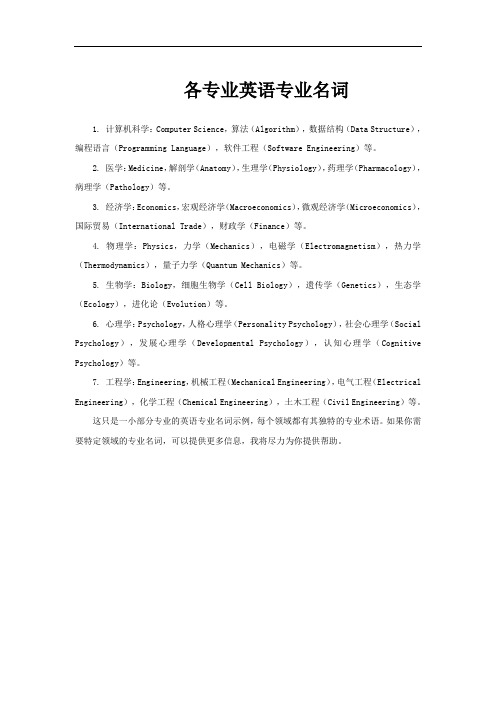
各专业英语专业名词1. 计算机科学:Computer Science,算法(Algorithm),数据结构(Data Structure),编程语言(Programming Language),软件工程(Software Engineering)等。
2. 医学:Medicine,解剖学(Anatomy),生理学(Physiology),药理学(Pharmacology),病理学(Pathology)等。
3. 经济学:Economics,宏观经济学(Macroeconomics),微观经济学(Microeconomics),国际贸易(International Trade),财政学(Finance)等。
4. 物理学:Physics,力学(Mechanics),电磁学(Electromagnetism),热力学(Thermodynamics),量子力学(Quantum Mechanics)等。
5. 生物学:Biology,细胞生物学(Cell Biology),遗传学(Genetics),生态学(Ecology),进化论(Evolution)等。
6. 心理学:Psychology,人格心理学(Personality Psychology),社会心理学(Social Psychology),发展心理学(Developmental Psychology),认知心理学(Cognitive Psychology)等。
7. 工程学:Engineering,机械工程(Mechanical Engineering),电气工程(Electrical Engineering),化学工程(Chemical Engineering),土木工程(Civil Engineering)等。
这只是一小部分专业的英语专业名词示例,每个领域都有其独特的专业术语。
如果你需要特定领域的专业名词,可以提供更多信息,我将尽力为你提供帮助。
专业英语作业生态学

一、1.Emerging organic contaminant removal depending on primary treatment and operational strategy in horizontal subsurface flow constructed wetlands: Influence of redox. 20 在水平潜流湿地中基于初级处理和运行方式对新兴有机污染物的去除:氧化还原反应的影响。
2. Pretreatment methods for aquatic plant biomass as carbon sources for potential use in treating eutrophic water in subsurface-flow constructed wetlands. 21潜流人工湿地预处理方法对水生植物生物量作为碳源在富营养化水体处理中的潜在应用。
3.Performance of pilot-scale constructed wetlands for secondary treatment of chromium-bearing tannery wastewaters. 14 中试规模人工湿地作为制革厂含铬废水的二级处理的性能研究。
4. Influence of plants on microbial activity in a vertical-downflow wetland system treating waste activated sludge with high organic matter concentrations.21垂直流湿地废水处理系统的含高有机物浓度的活性污泥中微生物活动对植物的影响。
5.Toxicity of high salinity tannery wastewater and effects on constructed wetland plants. 12制革厂废水的高盐分对人工湿地植物的毒性和影响。
生态学专业英语词汇总结
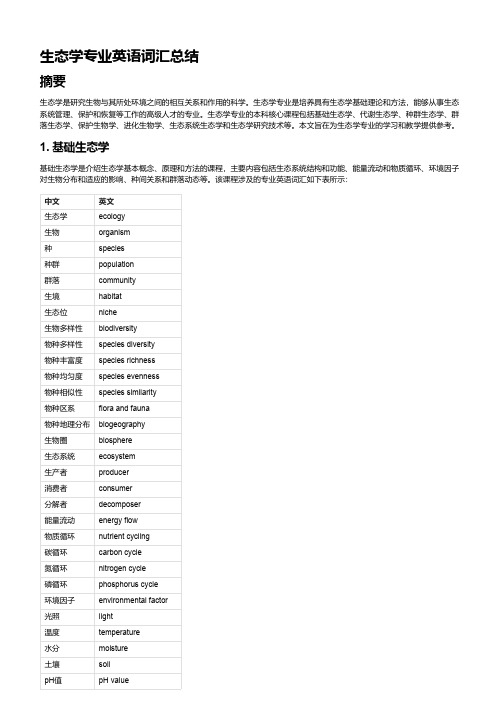
生态学专业英语词汇总结摘要生态学是研究生物与其所处环境之间的相互关系和作用的科学。
生态学专业是培养具有生态学基础理论和方法,能够从事生态系统管理、保护和恢复等工作的高级人才的专业。
生态学专业的本科核心课程包括基础生态学、代谢生态学、种群生态学、群落生态学、保护生物学、进化生物学、生态系统生态学和生态学研究技术等。
本文旨在为生态学专业的学习和教学提供参考。
1. 基础生态学基础生态学是介绍生态学基本概念、原理和方法的课程,主要内容包括生态系统结构和功能、能量流动和物质循环、环境因子对生物分布和适应的影响、种间关系和群落动态等。
该课程涉及的专业英语词汇如下表所示:中文英文生态学ecology生物organism种species种群population群落community生境habitat生态位niche生物多样性biodiversity物种多样性species diversity物种丰富度species richness物种均匀度species evenness物种相似性species similarity物种区系flora and fauna物种地理分布biogeography生物圈biosphere生态系统ecosystem生产者producer消费者consumer分解者decomposer能量流动energy flow物质循环nutrient cycling碳循环carbon cycle氮循环nitrogen cycle磷循环phosphorus cycle环境因子environmental factor光照light温度temperature水分moisture土壤soilpH值pH value盐度salinity适应性adaptation突变mutation自然选择natural selection遗传漂变genetic drift基因流gene flow物种形成speciation物种灭绝extinction种间关系interspecific interaction共生关系symbiosis寄生关系parasitism共利关系mutualism共栖关系commensalism捕食关系predation2. 代谢生态学代谢生态学是研究生物体在不同环境条件下的能量代谢和物质转化过程及其规律的课程,主要内容包括代谢类型、代谢率、代谢平衡、代谢效率、代谢策略等。
- 1、下载文档前请自行甄别文档内容的完整性,平台不提供额外的编辑、内容补充、找答案等附加服务。
- 2、"仅部分预览"的文档,不可在线预览部分如存在完整性等问题,可反馈申请退款(可完整预览的文档不适用该条件!)。
- 3、如文档侵犯您的权益,请联系客服反馈,我们会尽快为您处理(人工客服工作时间:9:00-18:30)。
一、1.Emerging organic contaminant removal depending on primary treatment and operational strategy in horizontal subsurface flow constructed wetlands: Influence of redox. 20 在水平潜流湿地中基于初级处理和运行方式对新兴有机污染物的去除:氧化还原反应的影响。
2. Pretreatment methods for aquatic plant biomass as carbon sources for potential use in treating eutrophic water in subsurface-flow constructed wetlands. 21潜流人工湿地预处理方法对水生植物生物量作为碳源在富营养化水体处理中的潜在应用。
3.Performance of pilot-scale constructed wetlands for secondary treatment of chromium-bearing tannery wastewaters. 14 中试规模人工湿地作为制革厂含铬废水的二级处理的性能研究。
4. Influence of plants on microbial activity in a vertical-downflow wetland system treating waste activated sludge with high organic matter concentrations.21垂直流湿地废水处理系统的含高有机物浓度的活性污泥中微生物活动对植物的影响。
5.Toxicity of high salinity tannery wastewater and effects on constructed wetland plants. 12制革厂废水的高盐分对人工湿地植物的毒性和影响。
6. Microbial diversity, tolerance, and biodegradation potential of urban wetlands with different input regimes. 13 不同给料方法的城市湿地中微生物多样性,耐药性和生物降解潜力。
7.Treatment of estrogens and androgens in dairy wastewater by a constructed wetland system.13 人工湿地系统对牛奶厂废水中雌激素和雄激素的处理。
8.Pollutant removal in a multi-stage municipal wastewater treatment system comprised of constructed wetlands and a maturation pond, in a temperate climate. 22在适度气候条件下由人工湿地和成熟塘组成的多阶段生活废水处理系统中的污染物的去除。
9.Vegetated ditches for treatment of surface water with highly fluctuating water regime. 12植被沟对高波动的交替进排水机制表面流的处理。
10.Nitrogen removal in an integrated constructed wetland treating domestic wastewater. 10在一个整合的人工湿地生活污水处理系统中的氮去除。
Word numbers: 10-22 ,7 of 10 within 17 words. Form PubMed.parison of interannual removal variation of various constructed wetland types.Hijosa-Valsero M, Sidrach-Cardona R, Bécares E.AbstractSeven mesocosm-scale (1m(2)) constructed wetlands (CWs) of different configurations were operated outdoors for thirty-nine months under the same conditions to assess their ability to remove organic matter and nutrients from urban wastewaters. CWs differed in some design parameters, namely the presence of plants, the species chosen (i.e., Typha angustifolia or Phragmites australis), the flow configuration (i.e., surface flow or subsurface flow) and the presence/absence of a gravel bed. It was observed that, in general, removal efficiencies decreased with the aging of the system and that seasonality had a great influence on CWs. A comparison was made in order to figure out which kind of CW was more efficient for the removal of every pollutant in the long term. Planted systems were clearly better than unplanted systems even in winter. Efficiency differences among CWs were not extremely great, especially after a few years. However, some types of CWs were more adequate for the removal of certain pollutants. The effect of the aging on the main parameters involved in pollutant removal in CWs (temperature, pH, conductivity, dissolved oxygen concentration and redox potential) was assessed. The efficiency of CWs should not be evaluated based on short monitoring periods (1-2 years) after the start-up of the systems, but on longer periods.对于不同类型的人工湿地年际去除率变化的比较建立了七个不同规模的中性试验生态系人工湿地,在相同户外条件下运行39个月,评估它们去除城市污水中的有机物和营养物质的能力。
这些人工湿地在一些设计参数上是不同的,即存在的植物种类,物种的选择,水流的类型(例如表面流或潜流)以及沙砾床的存在与否等方面的不同。
可以观察到通常来说,人工湿地的去除效率随着系统年龄的上升而降低,且季节性变化对人工湿地有很大的影响。
我们做了一个比较来找出在长期运行上来看哪种人工湿地对去除各种污染物更有效。
种有植物的系统即使在冬天也比没有植物的系统要好。
这些人工湿地的效率差异是不显著的,尤其在运行多年以后。
但是,某些类型的人工湿地更适合去除特定类型的污染物。
我们对年龄变化对人工湿地污染物去除的影响的主要参数(温度,pH,导电性,溶解氧浓度和氧化还原电势)也进行了评估。
对人工湿地效率评价不能基于建成后短期(1-2年)运行的系统,而是要运行更长时间以后的检测参数才更为有效。
Seasonal performance of an outdoor constructed wetland for graywater treatment in a temperate climateJokerst A, Sharvelle SE, Hollowed ME, Roesner LA.AbstractThe seasonal treatment efficiency of a pilot-scale constructed wetland system located outdoors in a semi-arid, temperate climate was evaluated for graywater in a comprehensive, 1-year study. The system consisted of two wetland beds in series--a free water surface bed followed by a subsurface flow bed. Water quality monitoring evaluated organics, solids, nutrients, microbials, and surfactants. The results showed that the wetland substantially reduced graywater constituents during fall, spring, and summer, including biochemical oxygen demand (BOD) (92%), total nitrogen (85%), total phosphorus (78%), total suspended solids (TSS) (73%), linear alkylbenzene sulfonate (LAS) surfactants (94%), and E. coli (1.7 orders of magnitude). Except for TSS, lower removals of graywater constituents were noted in winter--BOD (78%), total nitrogen (64%), total phosphorus (65%), LAS (87%), and E. coli (1.0 order), indicating that, although wetland treatmentslowed during the winter, the system remained active, even when the average water temperature was 5.2 +/- 4.5 degrees C.温带气候用于处理灰水的露天人工湿地随季节变化的运行情况对处于半干旱温带地区的中试规模的露天人工湿地系统的季节性处理灰水效率进行了为期一年的综合性评价。
